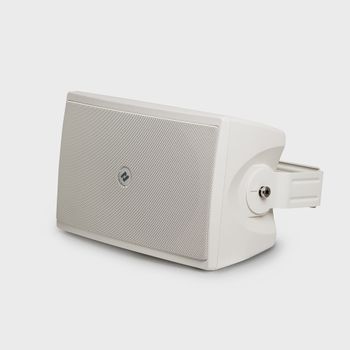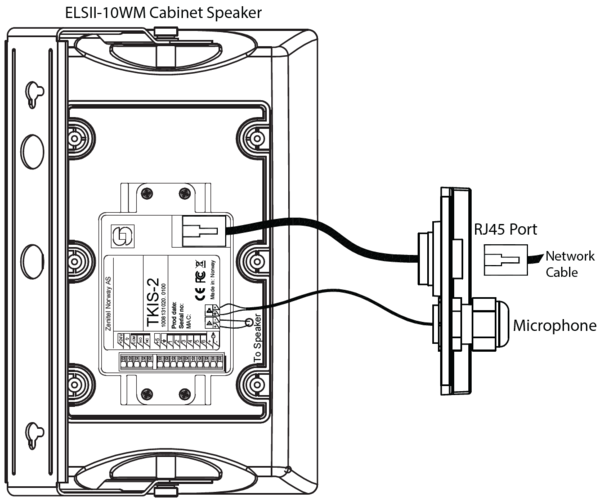ELSII-10WM: Difference between revisions
From Zenitel Wiki
No edit summary |
No edit summary |
||
| (10 intermediate revisions by 2 users not shown) | |||
| Line 1: | Line 1: | ||
{{ | {{ACEIS}} | ||
ELSII-10WM is a network on-wall cabinet loudspeaker with a built-in 10W amplifier and microphone. The microphone is used e.g. for talkback and for [[Automatic Volume Control AVC|Automatic Volume Control]]. | {{obs|This product is replaced by [[ZIPS-WC|ZIPS-WC (1023321311)]]}} | ||
ELSII-10WM is a network on-wall cabinet loudspeaker with a built-in 10W amplifier and microphone. The microphone is used e.g. for talkback and for [[Automatic Volume Control (AVC)|Automatic Volume Control]]. | |||
[[File:Cabinet speaker-ELSII-10WM left 2000x2000px.jpg|thumb|350px|On-Wall Cabinet Speaker<br>(1023302330)]] | [[File:Cabinet speaker-ELSII-10WM left 2000x2000px.jpg|thumb|350px|On-Wall Cabinet Speaker<br>(1023302330)]] | ||
== HowTo video== | == HowTo video== | ||
<div style="text-align:left;"> <youtube width="300" height="180"> | <div style="text-align:left;"> <youtube width="300" height="180">HLIiJm8m2Cs</youtube> </div> | ||
<br><br> | <br><br> | ||
| Line 18: | Line 20: | ||
== Configuration == | == Configuration == | ||
The | The device can operate in [[Main Settings (IP Stations)|different modes]]. Set the mode according to the server the station should register to. | ||
* [[IP Station Configuration - ICX-AlphaCom mode|ICX-AlphaCom mode]] | * [[IP Station Configuration - ICX-AlphaCom mode|ICX-AlphaCom mode]] | ||
* [[Adding station to existing system (Edge)|Edge mode]] | * [[Adding station to existing system (Edge)|Edge mode]] | ||
* [[SIP Intercom | * [[SIP Intercom - Web Interface|SIP mode]] | ||
{{note|To use this device with [[:Category:Zenitel Connect Pro|Zenitel Connect Pro]] it must be factory defaulted. The device configuration is done from the Zenitel Connect Pro server.}} | |||
== Conversation mode == | == Conversation mode == | ||
To prevent acoustic echo during two-way communication with the speaker, the speaker will be in "PTT-mode" (Simplex mode). This means that the operator needs to press the M-key or (or the *-key on an ITSV phone) to talk, and release the M-key (or press the #-key) to listen. This mode of operation is default when the IP speaker is used in Edge or SIP mode. When used in ICX-AlphaCom mode, one have to [[PTT mode - IP Speakers|configure "PTT-mode"]]. | To prevent acoustic echo during two-way communication with the speaker, the speaker will be in "PTT-mode" (Simplex mode). This means that the operator needs to press the M-key or (or the *-key on an ITSV phone) to talk, and release the M-key (or press the #-key) to listen. This mode of operation is default when the IP speaker is used in Edge or SIP mode. When used in ICX-AlphaCom mode, one have to [[PTT mode - IP Speakers|configure "PTT-mode"]]. | ||
== Disabling the microphone == | |||
The microphone can be disabled by [[Logging into an Zenitel IP Device|logging into the web interface]] of the loudspeaker, enable "Advanced Configuration" mode, and navigate to '''Audio Settings''' > '''Audio Inputs''', and set '''Internal Microphone''' = ''Not Connected''. | |||
(This option is available as from firmware 7.5.3.1). | |||
Talkback and Automatic Volume Control will no longer work when the microphone is disabled. | |||
== ONVIF support == | == ONVIF support == | ||
| Line 34: | Line 42: | ||
The IP Speaker is streaming video that shows JPEG image of the Zenitel logo, using 1 FPS (Frame Per Second) to provide compatibility with various VMS systems. Maximum RTSP stream count is 1 microphone audio, 1 JPEG video and 1 backchannel audio. RTSP PLAY will respond with 453 "Not Enough Bandwith" if that limit is breached. | The IP Speaker is streaming video that shows JPEG image of the Zenitel logo, using 1 FPS (Frame Per Second) to provide compatibility with various VMS systems. Maximum RTSP stream count is 1 microphone audio, 1 JPEG video and 1 backchannel audio. RTSP PLAY will respond with 453 "Not Enough Bandwith" if that limit is breached. | ||
* The IP Speaker is using '''port 8095''' for ONVIF | * The IP Speaker is using '''TCP port 8095''' for ONVIF | ||
* HTTP tunneling is done over RTSP '''port 554''' | * HTTP tunneling is done over RTSP '''TCP port 554''' | ||
'''ONVIF Audio Backchannel:'''<br> | '''ONVIF Audio Backchannel:'''<br> | ||
| Line 46: | Line 54: | ||
* [[TKIS Restore Factory Defaults|Restore Factory Defaults]] | * [[TKIS Restore Factory Defaults|Restore Factory Defaults]] | ||
* [[Turbine Software Upgrade|Upgrade via the station web interface]] | * [[Turbine Software Upgrade|Upgrade via the station web interface]] | ||
* [[ | * [[IMT - Discover & Upgrade|Upgrade using the IMT tool]] | ||
* [[Automatic Software Upgrade|Automatic Software Upgrade (SIP mode only)]] | * [[Automatic Software Upgrade|Automatic Software Upgrade (SIP mode only)]] | ||
* [[:Category:IMX28 Release notes|Software Release Notes]] | |||
== Connectors, Indicators and Dimensions == | == Connectors, Indicators and Dimensions == | ||
The ELSII-10WM IP Speaker has a Turbine kit [[TKIS-2]] inside. | The ELSII-10WM IP Speaker has a Turbine kit [[TKIS-2]] inside. | ||
* [[Turbine Compact | * [[Turbine Compact series board connectors|Device Connections]] | ||
* [[TKIS Indication LEDs|Station Indication LEDs]] | * [[TKIS Indication LEDs|Station Indication LEDs]] | ||
* [[Speaker Dimensions & Mounting Instructions|Dimensions]] | * [[Speaker Dimensions & Mounting Instructions|Dimensions]] | ||
| Line 62: | Line 71: | ||
[[Category: Turbine]] | [[Category: Turbine]] | ||
[[Category: | [[Category: IP Speakers]] | ||
Latest revision as of 12:54, 14 January 2025

|
This product is replaced by ZIPS-WC (1023321311) |
ELSII-10WM is a network on-wall cabinet loudspeaker with a built-in 10W amplifier and microphone. The microphone is used e.g. for talkback and for Automatic Volume Control.
HowTo video
Installation
The ELSII-10WM comes with an external RJ45 port that is pre-wired to the TKIS-2 kit inside the unit.
- Remove the RJ45 port cover and plug in the network cable.
- Optional - To validate connections, remove the back plate and check the wiring between microphone, speaker, external port and the TKIS-2 kit.

|
Installation of the speaker must be done using shielded Ethernet cables with grounding at the switch end. |
Configuration
The device can operate in different modes. Set the mode according to the server the station should register to.

|
To use this device with Zenitel Connect Pro it must be factory defaulted. The device configuration is done from the Zenitel Connect Pro server. |
Conversation mode
To prevent acoustic echo during two-way communication with the speaker, the speaker will be in "PTT-mode" (Simplex mode). This means that the operator needs to press the M-key or (or the *-key on an ITSV phone) to talk, and release the M-key (or press the #-key) to listen. This mode of operation is default when the IP speaker is used in Edge or SIP mode. When used in ICX-AlphaCom mode, one have to configure "PTT-mode".
Disabling the microphone
The microphone can be disabled by logging into the web interface of the loudspeaker, enable "Advanced Configuration" mode, and navigate to Audio Settings > Audio Inputs, and set Internal Microphone = Not Connected. (This option is available as from firmware 7.5.3.1).
Talkback and Automatic Volume Control will no longer work when the microphone is disabled.
ONVIF support
Zenitel IP Speakers support the ONVIF protocol.
ONVIF Profile S:
The IP Speaker has ONVIF "profile S" support and capabilities, similar to video devices. This enables e.g. an ONVIF VMS Client to monitor the built-in microphone if the IP Speaker.
The IP Speaker is streaming video that shows JPEG image of the Zenitel logo, using 1 FPS (Frame Per Second) to provide compatibility with various VMS systems. Maximum RTSP stream count is 1 microphone audio, 1 JPEG video and 1 backchannel audio. RTSP PLAY will respond with 453 "Not Enough Bandwith" if that limit is breached.
- The IP Speaker is using TCP port 8095 for ONVIF
- HTTP tunneling is done over RTSP TCP port 554
ONVIF Audio Backchannel:
The IP Speaker supports the ONVIF audio backchannel. This enables an ONVIF VMS Client to send audio to the IP Speaker.
ONVIF configuration is done from the Web interface of the IP Speaker.
Restore Factory Defaults and Software Upgrade
The ELSII-10WM IP Speaker has a Turbine kit TKIS-2 inside.
- Restore Factory Defaults
- Upgrade via the station web interface
- Upgrade using the IMT tool
- Automatic Software Upgrade (SIP mode only)
- Software Release Notes
Connectors, Indicators and Dimensions
The ELSII-10WM IP Speaker has a Turbine kit TKIS-2 inside.
Software Requirements
If the IP Speaker is used with an AlphaCom XE server, the server must have minimum version 11.2.3.7.


